North America is in a bird-loss crisis.
1. Make Windows Safer, Day and Night
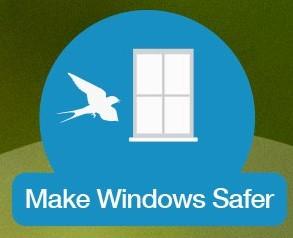 The challenge: Up to 1 billion birds are estimated to die each year after hitting windows in the United States and Canada.
The challenge: Up to 1 billion birds are estimated to die each year after hitting windows in the United States and Canada.
What's going on?: During the day, birds perceive reflections in glass as safe places they can fly into. By night, migrating birds are drawn in by city lights and can collide with buildings.
These simple steps save birds: On the outside of the window, install screens or break up reflections using decals—like our hummingbird, butterfly, maple leaf and leaf medley designs. You can also use string or paint. Space any of these options no more than two inches high or four inches wide.
2. Keep Cats Indoors
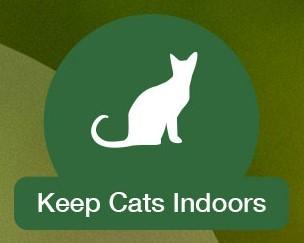
The challenge: Cats kill about 2.6 billion birds annually in the U.S. and Canada. Aside from habitat loss, this is the #1 human-caused reason for the loss of birds.
Details: Cats can make great pets, but more than 110 million feral and pet cats now roam in the United States and Canada. These nonnative predators instinctively hunt and kill birds even when well fed.
A solution that’s good for cats and birds: Save birds and keep cats healthy by keeping cats indoors. Or, train your cat to walk on a leash.
3. Reduce Lawn, Plant Natives
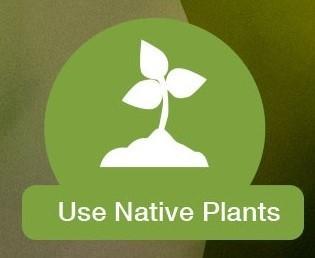 The challenge: Birds have fewer places to safely rest during migration and to raise their young: More than 10 million acres of land in the United States were converted to developed land from 1982 to 1997. Lawns and pavement don’t offer enough food or shelter for many birds and other wildlife.
The challenge: Birds have fewer places to safely rest during migration and to raise their young: More than 10 million acres of land in the United States were converted to developed land from 1982 to 1997. Lawns and pavement don’t offer enough food or shelter for many birds and other wildlife.
Encouraging news: With more than 40 million acres of lawn in the U.S. alone, there’s huge potential to support wildlife by replacing lawns with native plantings.
The solution: Add native plants to watch birds come in. Native plants add interest and beauty to your yard and neighborhood, and provide shelter and nesting areas for birds.
4. Avoid Pesticides
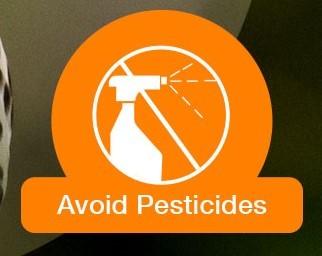 The challenge: More than 1 billion pounds of pesticides are applied in the United States each year. The continent’s most widely used insecticides, called neonicotinoids or “neonics,” are lethal to birds and to the insects that birds consume. Common weed killers used around homes, such as 2, 4-D and glyphosate (used in Roundup), can be toxic to wildlife, and glyphosate has been declared a probable human carcinogen.
The challenge: More than 1 billion pounds of pesticides are applied in the United States each year. The continent’s most widely used insecticides, called neonicotinoids or “neonics,” are lethal to birds and to the insects that birds consume. Common weed killers used around homes, such as 2, 4-D and glyphosate (used in Roundup), can be toxic to wildlife, and glyphosate has been declared a probable human carcinogen.
A healthy choice for you, your family, and birds: Consider purchasing organic food. Nearly 70% of produce sold in the U.S. contains pesticides. Reduce pesticides around your home and garden.
5. Drink Coffee That’s Good for Birds
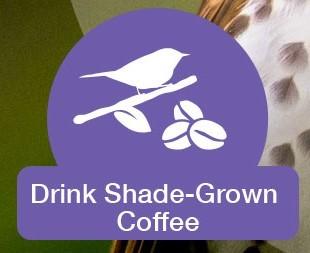 The challenge: Three-quarters of the world’s coffee farms grow their plants by first destroying forests that birds and other wildlife need for food and shelter.
The challenge: Three-quarters of the world’s coffee farms grow their plants by first destroying forests that birds and other wildlife need for food and shelter.
Solution: Coffee can be grown under trees, without destroying huge swaths of forest. These shade-grown coffee beans preserve forest canopies so birds can still inhabit that environment. Too few consumers are aware of the problems of sun coffee. Those who are aware may be reluctant to pay more for environmentally sustainable coffee.
Look for the Bird Friendly coffee certification: It’s a win-win-win: it’s delicious, economically beneficial to coffee farmers, and helps more than 42 species of North American migratory songbirds that winter in coffee plantations, including orioles, warblers, and thrushes. We try to carry Bird Friendly coffee beans in-stores - call us at (604) 988-2121 to find out more!
6. Protect Our Planet from Plastic
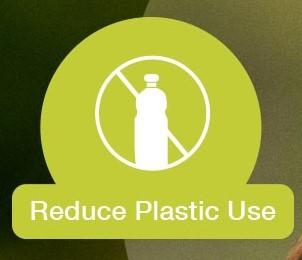 The challenge: It’s estimated that 4,900 million metric tons of plastic have accumulated in landfills and in our environment worldwide, polluting our precious waters and lands. Plastic takes more than 400 years to degrade. They can end up in the stomachs of birds.
The challenge: It’s estimated that 4,900 million metric tons of plastic have accumulated in landfills and in our environment worldwide, polluting our precious waters and lands. Plastic takes more than 400 years to degrade. They can end up in the stomachs of birds.
Reduce your plastics: Avoid single-use plastics including bags, bottles, wraps, and disposable utensils. It’s far better to choose reusable items, but if you do have disposable plastic, be sure to recycle it. Advocate for bans of plastic bags, styrofoam, and straws.
WBU Vancouver offers reusable paper bags though we request that you bring your own.
7. Watch Birds, Share What You See
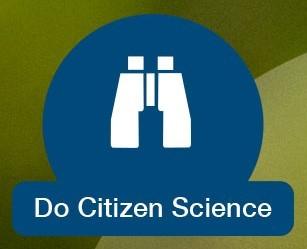 The challenge: The world’s most abundant bird, the Passenger Pigeon, went extinct, and people didn’t realize how quickly it was vanishing until it was too late. Monitoring birds is essential to help protect them, but tracking the health of the world’s 10,000 bird species is an immense challenge.
The challenge: The world’s most abundant bird, the Passenger Pigeon, went extinct, and people didn’t realize how quickly it was vanishing until it was too late. Monitoring birds is essential to help protect them, but tracking the health of the world’s 10,000 bird species is an immense challenge.
Call to action: Scientists need hundreds of thousands of people to report what they’re seeing in backyards, neighborhoods, and wild places around the world. Without this information, scientists will not have enough timely data to show where and when birds are declining around the world.
Enjoy birds while helping science and conservation: Join a project such as eBird, Project FeederWatch, Christmas Bird Count or Breeding Bird Survey. Your contributions will provide valuable information to show where birds are thriving—and where they need our help.
Looking for more?

